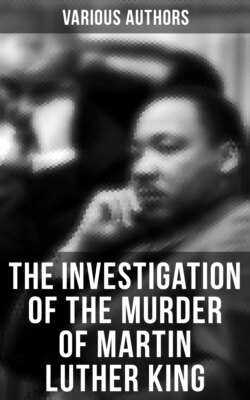Читать книгу The Investigation of the Murder of Martin Luther King - Various Authors - Страница 4
На сайте Литреса книга снята с продажи.
Overview
ОглавлениеTable of Contents
On August 26, 1998, the Attorney General directed the Civil Rights Division of the United States Department of Justice, assisted by the Criminal Division, to investigate two separate, recent allegations related to the April 4, 1968 assassination of Dr. Martin Luther King, Jr. These allegations emanate from Loyd Jowers, a former Memphis tavern owner, and Donald Wilson, a former agent with the Federal Bureau of Investigation (FBI).
In 1993, 25 years after the murder, Jowers claimed that he participated in a conspiracy to kill Dr. King, along with an alleged Mafia figure, Memphis police officers, and a man named Raoul. According to Jowers, one of the conspirators shot Dr. King from behind his tavern.
Wilson alleged in 1998 that shortly after the assassination, while working as an FBI agent, he took papers from the abandoned car of James Earl Ray, the career criminal who pled guilty to murdering Dr. King. Wilson claims he concealed them for 30 years. Some of the papers contained references to a Raul (the alternate spellings, Raoul and Raul, are discussed in Section I) and figures associated with the assassination of President John F. Kennedy. According to Wilson, someone who later worked in the White House subsequently stole the other papers he took from Ray's car, including one with the telephone number of an FBI office.
Both the Jowers and the Wilson allegations suggest that persons other than or in addition to James Earl Ray participated in the assassination. Ray, within days of entering his guilty plea in 1969, attempted to withdraw it. Until his death in April 1998, he maintained that he did not shoot Dr. King and was framed by a man he knew only as Raoul. For 30 years, others have similarly alleged that Ray was Raoul's unwitting pawn and that a conspiracy orchestrated Dr. King's murder. These varied theories have generated several comprehensive government investigations regarding the assassination, none of which confirmed the existence of any conspiracy. However, in King v. Jowers, a recent civil suit in a Tennessee state court, a jury returned a verdict finding that Jowers and unnamed others, including unspecified government agencies, participated in a conspiracy to assassinate Dr. King.
Our mission was to consider whether the Jowers or the Wilson allegations are true and, if so, to detect whether anyone implicated engaged in criminal conduct by participating in the assassination. We have concluded that neither allegation is credible. Jowers and Wilson have both contradicted their own accounts. Moreover, we did not find sufficient, reliable evidence to corroborate either of their claims. Instead, we found significant evidence to refute them. Nothing new was presented during King v. Jowers to alter our findings or to warrant federal investigation of the trial's conflicting, far-ranging hearsay allegations of a government-directed plot involving the Mafia and African American ministers closely associated with Dr. King. Ultimately, we found nothing to disturb the 1969 judicial determination that James Earl Ray murdered Dr. King or to confirm that Raoul or anyone else implicated by Jowers or suggested by the Wilson papers participated in the assassination.
